Expectation Management Department

Let's jump into 2025 by unpacking what's expected this year versus what we may see, beginning with one of the most significant and widely debated market catalysts in recent times: the US Presidential Inauguration on January 20th. As this is also our inaugural blog of 2025, we will make the case for how this event could impact our market, exploring some scenarios, the good, the bad, and the ugly.
Like it or not, global markets are entirely intertwined, and financial commentators are almost wholly divided on what may happen. The bear case is the most straightforward in this instance; it's a difficult read, so please feel free to skip to the next paragraph for those of a sensitive disposition. US indices have been up two years straight, so to lean into a gambler's fallacy, we may be 'due' a pullback. Unpacking that idea, what often happens in financial markets is the 'tail wags the dog'; people act on the consensus narrative in such sufficient numbers that a scenario occurs led purely by global groupthink; we believe this will happen, ergo it becomes so, we will it into existence, it's economic manifestation. The more refined way of looking at it is there are parallels to the 1930s; looming aggressive tariffs under a Trump administration may create a slowdown in global trade, forcing up US Treasuries to 5%+ as inflation embeds further and creating a downward cascade in a market that is heavily levered on the expectation of upward movement. Or, in layperson’s terms, the market is betting the numbers will go up next year, betting on costly stocks with a lot of borrowed money.
Could the global bearish case be good for inflows from equities into fixed-income and private credit markets, including those backed by UK Real Estate? One of the advantages of diversification and our sector is that there is some truth that in the unlikely scenario of a global recession, all businesses will struggle. If you are investing in a business's ability to build homes, that business needs to be operating correctly. However, there is also some truth that the UK housing market is a perfect hybrid of public and private sector actors for a reason: it's too big to fail on an almost societal level. Without an adequate supply of homes, the UK economy fails, so taking this to a grandiose conclusion here, investors understand that on a higher level, they are simply investing in the UK's ability to house its citizens adequately.
Now for the bullish case: Inflation is coming down or flattening across the globe; the reverse consensus to the above is that central bank rates will be coming down, which we know from economic principles will spike global liquidity levels and should be visible in the Global M2 data. Again, in layperson's terms, cheapening borrowing across the board, if it can be done without harming the purchasing power of fiat currency, inflates the value of businesses and assets, increases jobs, and is good for everyone. This is specific to America, but one could argue that Trump historically has been pro-business and anti-heavy regulation; in the short term, the market will see this as a positive.
To summarise every Wall st institution's predictions, the expectation management warnings from the expectation management departments have gone out to investors to suggest that equity returns of 20%+ will unlikely be on the cards again, but comparisons between last year and the run-up to the implosion of the 2000 tech bubble are primarily misleading, as there are pretty substantial primary differences. Companies that ran up the indices in 2024 aren't just a series of WordPress websites; they have product and technology and substantial balance sheets driven by cash flow. Secondly, the consensus on A.I, the accepted narrative, is that this is just the beginning of an industry that will lead the next great industrial revolution, so it's challenging to see a future where the value of those businesses doesn't grow exponentially, albeit the speculative mania may begin to fade in 2025.
To look at how the bull case will affect us, we can only look at the positives of the previous presidency, which influenced the UK economy positively through policies that fostered stronger US-UK trade relations. The last pre-covid Trump administration prioritised bilateral trade agreements, paving the way for a potential US-UK free trade deal post-Brexit. This deal promised enhanced market access and lower tariffs, benefiting UK construction industries. There is no real reason to believe that the same deals can't be struck again; the will and the appetite are certainly there.
Finally, and on a separate note, we wish everyone a Happy New Year for 2025. As we look ahead to the new year, we invite borrowers and lenders to connect with us and explore the opportunities waiting for you. Whether you're ready to build the homes of the future or unlock innovative ways to make your money work harder, we're here to help you achieve even more.
Invest & Fund has returned over £200 million of capital and interest to lenders with zero losses, showing the rigour that governs our business.
To take maximum advantage of this robust and exciting asset class, please visit www.investandfund.com
Don't invest unless you're prepared to lose money. This is a high-risk investment. You may not be able to access your money quickly and are unlikely to be protected if something goes wrong. Take 2 minutes to learn more.